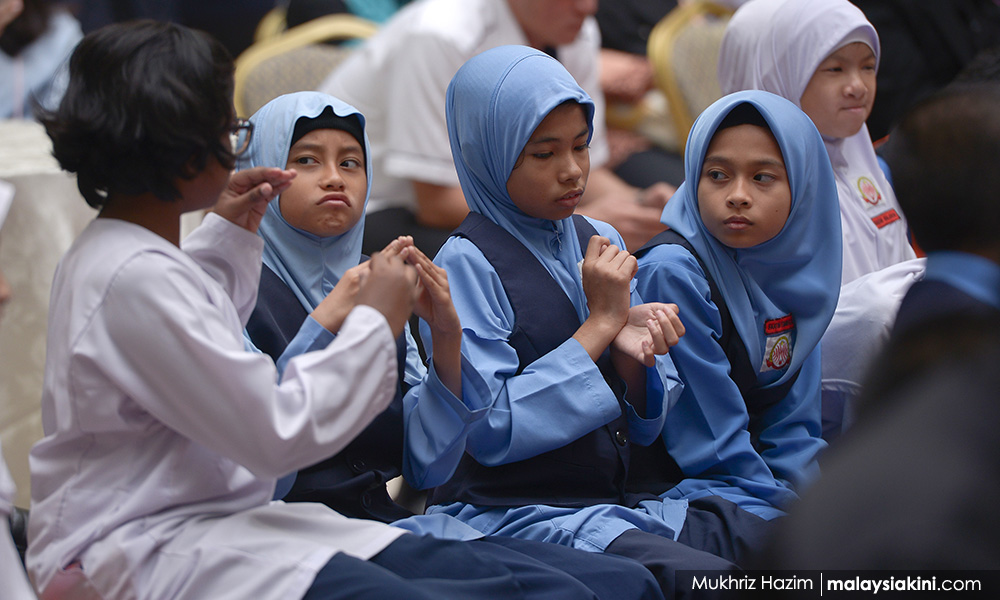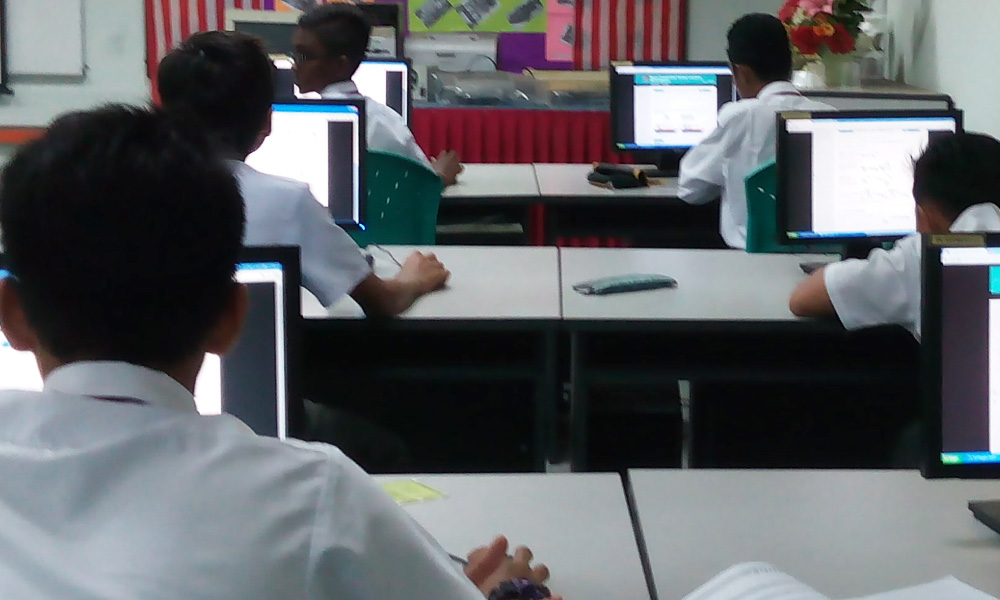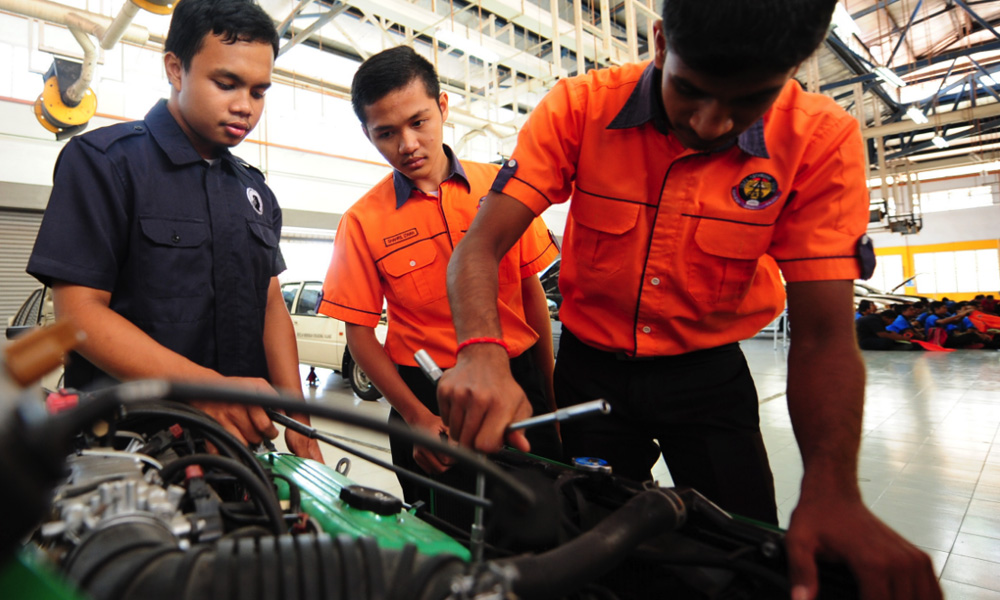Outgoing Education Minister Maszlee Malik took swipes at negative press and politicking for drowning out the ministry's achievements during his helm.
He said this came to define him and his ministry, which was inundated by politicking more than education issues.
Below is his translated speech text, including off-the-cuff remarks he made while reading it:
When I first entered this building as the education minister nearly 20 months ago, I always imagined how tough the responsibility to helm these two strategic (education and higher education) ministries would be.
Since the very first day, I had expected that there would be many controversies ahead, especially because we were in the transition of government phase, and also the high expectations of the people, who have different wishes between one another.
Also, there is so much freedom now that had never existed during BN's time, which gives the opportunity for all to voice out and lobby their interests and agendas in the education sector.
However, since 2018, the Education Ministry has been transparent with all its initiatives and education reform progress. The Education Ministry became the first ministry to table its 100 Days of Pakatan Harapan report and then an annual performance report card for 2019. This trend was then followed by other ministries. Even yesterday, there were other ministries that had just tabled their report. What is important is that the Education Ministry is in the lead.
We hope that this trend would be a precedent for all ministries and the Education Ministry in the future. If there is a legacy that we want to leave at the Education Ministry, we want to spearhead transparency and accountability, and this is what is called good governance.
The year 2019 proved that several initiatives that we introduced had been successful. Nearly 90 percent of the impoverished school projects we worked on were completed ahead of time. We published the progress on our website. Never before were such government projects done so transparently and was accessible to the public.
Inclusive policies that we introduced for the Students of Special Needs (MBK), the B40 group, undocumented children and the Zero Reject policy had given new meaning to hundreds of thousands of students nationwide.

Malaysian children regardless of race, background or which state they came from. We see thousands have returned to school, thousands have managed to continue their education in school and universities.
As well as undocumented students whom we have registered to enter schools, whom before this had been neglected. These those who were in danger of not being in school.
Other initiatives, most of which was to lessen the burden of teachers and thus rejuvenate the spirit of the school community, we have worked on them. Many teachers are satisfied when their workloads were decreased bit by bit starting from 2019, as a result of our sessions with NUTP.
We know that the NUTP, which before this was a sort of an enemy to the ministry, but since 2018 it had become a strategic partner and even part of the ministry's extended family. I would like to thank the thousands of NUTP members and teachers associations that had been with us.
We have also launched the Malaysia Reads movement. This formed part of our efforts to make sure that by 2030, Malaysia would become a country of readers, and we have seen today that this reading campaign has been expanding nationwide. It is still new, but give it a few more years, we will be able to see a bigger change.
Even among our children in Year 1 and Year 3, where we have abolished their exam-based assessments and replaced with holistic assessments. We will focus on elements of reading and understanding so as to build a community that reads by 2030.
We have also done the review of the UUCA (Universities and University Colleges Act 1971) in Parliament, which also proves Pakatan Harapan's commitment to education reform.
We also want to restore quality enhancement as the main pillar of education. We must understand that the quality of education cannot be renewed overnight. There are too many systemic issues that are complex.
One of them is corruption. It is generally known that many parties had been getting contracts through cables before this. It is not a secret. The Education Ministry is among the ministries that were under MACC's radar, and it is working hard to battle this practice.
The Education Ministry even brought in (former auditor-general) Tan Sri Ambrin Buang and his committee to ensure that there is a check and balance and show the public how serious we are on the issue of corruption and leakages.
The Education Ministry's planning for 2020 is much bigger than all these achievements in 2019. Having solved a part of the systemic barriers, we would be able to carry out a much bigger system reformation.

For example, digital education can only be done if all schools have access to a fast and stable internet system. Before this, there was a monopoly and teachers could not even use the platform because it was too slow, and they were not given an option.
The Education Ministry had ensured that this system is open so that schools can choose which is the best Internet system and platform for their students. Only after this, can we focus on IR 4.0 and Stem (Science, Technology, Engineering and Mathematics) education in schools.
Besides the digital education plan, the Education Ministry's 2020 plan is also to increase the quality of schools and universities by focusing on teachers, lecturers, administrators and policymakers.
For teachers, this is why the Education Ministry is working very hard to ease the burden of irrelevant work so that we can then enhance the pedagogy. Even the Education Act will be reviewed to make it compulsory for our children to complete their secondary education.
Meanwhile, for universities, we are going to ensure that they can be more competitive at the global level. Our universities have to learn from the best universities in the world. A marketable framework will be launched where more relevant programmes and stronger industrial relations will be the focus. The review of UUCA will also give more autonomy to universities and academic freedom to increase quality.

This includes the renewal of our Tvet (Technical and Vocational Education and Training) programmes to enhance the marketability of our Tvet students to 96.5 percent.
However, as I have always stressed with my officers before this, we must change ourselves first before introducing changes to the school and universities. The Education Ministry has to be more effective and proactive. Every programme must be outcome-oriented.
When I helmed the Education Ministry, I always welcomed public-private partnerships because I know we can't reform this system alone. Schools belong to communities and universities belong to the people. The success of an education system means the success of the community. Education is the responsibility of all.
However, as I have explained earlier, I am not viewed through these successes. The Education Ministry had always come under the attention of the media and certain groups, as well as among politicians, not for our achievements, not for our successes, not for what we have contributed to the society, which had given significant meaning.
What happened in these 20 months could not be achieved in the previous years. The changes that we did in these 20 months were so significant and beautiful to be shared but unfortunately, they did not get any attention for headlines. More sensational titles were given to humiliate, many issues that were sensitive and purposely played up became the main focus.
In the end, I as the education minister was seen to have created many crises for the leadership, such as on Jawi, Internet at schools and the free breakfasts, among other issues.
I, however, believe that I have laid the foundation and set a clear course for the Education Ministry's people. It is neatly carried in the "Education for All" slogan. I believe this decision is not the end but instead, is the start of something new.
A struggle will never end in one space. The struggle to elevate education happens in every space. It is not the responsibility of a single ministry or a single minister, but it is the responsibility of all members of the community. Wherever we are, we are responsible to ensure for quality and the best education for all Malaysians. Believe me, the reformation of this country would never be successful without making the people's welfare as the main focus.
I would like to express my appreciation to Tun Mahathir for giving me the opportunity to helm the Education Ministry for 20 months. It was not easy, for someone who does not have a political background, for someone who is an academician, from the education (background), to be given the role to helm such a big ministry which if we are to see it, was more dogged by political issues rather than education itself. To me, this trust given by Tun was the best prize that had ever been given to me as an educator and academic activist.
I also would like to express my stand, support and undivided loyalty to him and my party, Bersatu.
On the advice of the prime minister, and on the basis of loyalty and discipline to the leadership of the party and the government, I, Maszlee Malik, return the post of Education Minister back to the prime minister effective from Jan 3, 2020.




